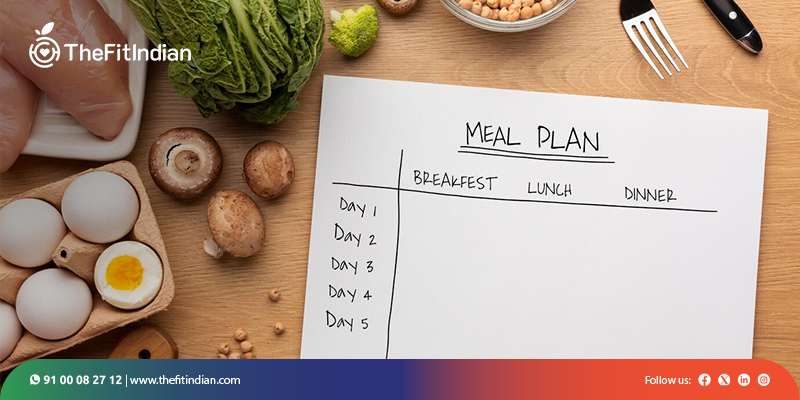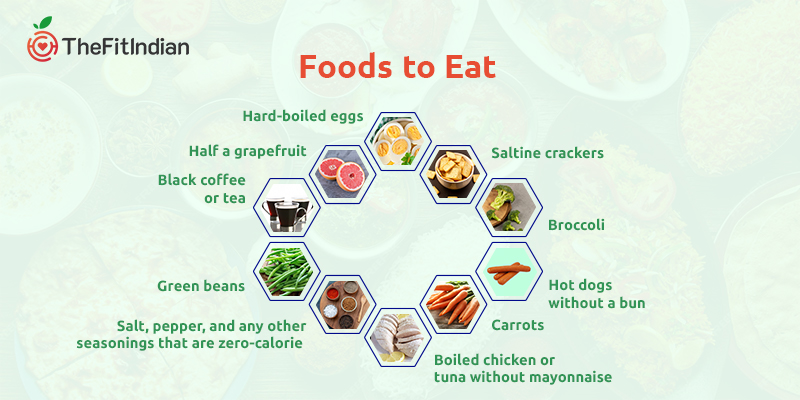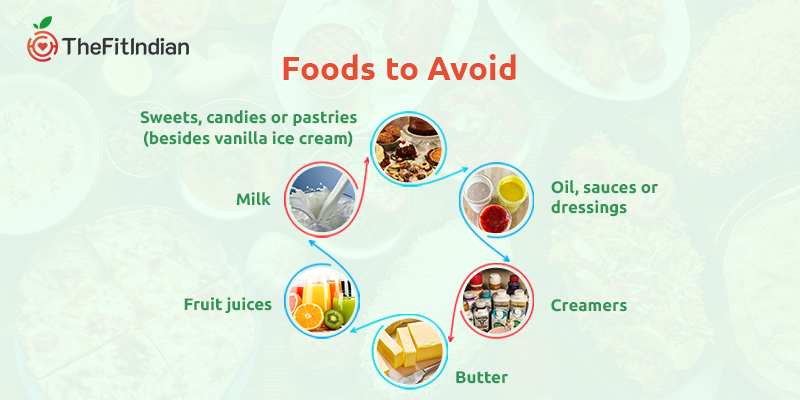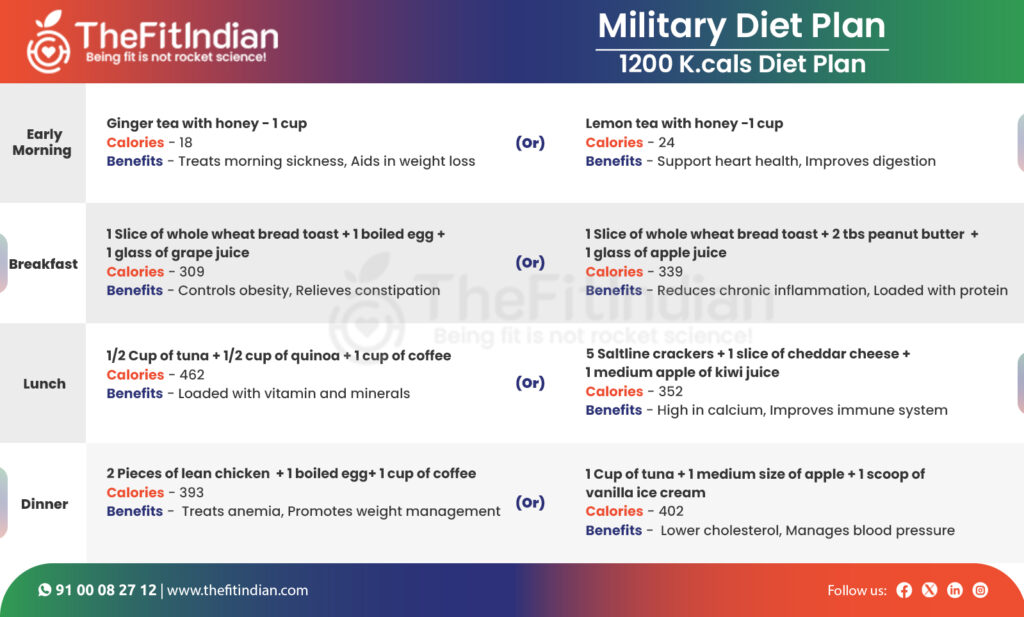Military Diet Plan for Weight Loss – Important Things to Know
Reviewed by: Dr. T S Deepthi Sarojini | Author: Manoja Kalakanti

People working in armies are supposed to be fit, flexible, and healthy – a typical job requirement. Besides following a strict fitness regime, they are also induced into healthy dietary plans. Usually, their diet includes substantial nutrient supplements, proteins, calories, and healthy carbohydrates to add the required fuel for a sustained energy source inside their body. A military diet plan for weight loss can work for others looking to cut down the extra kilos. However, in reality, this particular diet has no relation to what people in the army actually eat. This is a fundamental misconception most people have with the name especially. And to support the statement, some studies say that the effectiveness is usually short-term. Long-term adherence to a strict military diet regime has associated health risks. Soldiers would not want to indulge in a meal chart that could impact their health. Nevertheless, this diet plan can still be practiced under the supervision of an expert dietician because the short-term weight loss effects are still beneficial for athletes and others looking to gain prompt results.
So, don’t let the name misguide you. This blog will walk you through the dos and don’ts of a military diet plan.
Does a Military Diet Plan for Weight Loss Work?
The military diet is a strict form of intermittent fasting aimed at achieving short-term weight loss.
This plan involves a 3-day low-calorie diet followed by 4 days of regular eating. Daily intake is limited to 1,400, 1,200, and 1,100 calories over the first 3 days. During the other 4 days, the military diet advocates a 1,500-calorie plan. It’s worth highlighting that this calorie limit is below the recommended daily intake of 2,200–2,400 for adult males and 1,600–1,800 for adult females, as per the Dietary Guidelines for Americans 2020–2025.
The diet prioritizes high protein, low fat, low carbohydrate, and low-calorie foods, with specific combinations aimed at enhancing metabolism and fat burning.
However, the 7-day military diet plan can hardly guarantee uniform results for all recipients. The reason is that losing weight on a restrictive 1-week diet can vary depending upon an individual’s metabolism. It is impossible to predict how much weight a person might lose in a 7-day diet. Also, there are instances showing some people experiencing rapid weight gain after quitting the brief diet plan. One needs to have a concrete long-term plan at their disposal to keep the kilo counts in check.
To answer the question, yes, a military diet plan for weight loss is selectively effective but keep a backup diet ready to prevent long-term side effects.
What Are You Losing from a Military Diet?
A military diet plan for weight loss doesn’t guarantee 100% results in the long run, but it can substantially reduce more kilos in a span of one week. By following the restricted meal plan, an individual who is overweight or obese can witness the prominent difference between their original weight and ideal weight. Implementing calorie restriction results in a rapid rate of weight loss.
However, a significant portion of this weight loss is attributed to the reduction in water content rather than fat.
Carbohydrate and calorie restriction leads to diminished glycogen stores and a decrease in overall muscle mass. The swift depletion of the body’s glycogen stores contributes to a rapid decline in water weight.
While the scale may reflect the desired outcome, it comes at the expense of muscle and water loss. Engaging in such crash weight loss often results in weight regain once a regular eating pattern is resumed.
For effective and sustainable weight loss (10–15 kgs), it is essential to adopt a more comprehensive strategy that focuses on long-term success and overall health.
Military Diet for Weight Loss – Check Your Eligibility!
The Indian military diet for weight loss is not suitable for everyone. The intermittent fasting diet is effective for a short period, as stated before. If you expect a long-term, lasting impact, you are not eligible for it.
A military diet plan for weight loss is recommended primarily for those who need to shed unwanted kilos rapidly. It works best on those candidates who can sustain with a few calories and resist the hunger and low energy that follow with the plan. On the hind side, the intense hunger for more calories is likely to emerge with a vengeance as soon as the low-calorie period is over. Adhering to the low-calorie intake becomes excruciating. Also, nutritionists would not recommend a military diet for their clients above 50 years of age since a low-calorie plan could prove dangerous for them.
On the plus side, the diet plan is relatively affordable and healthy as it negates the inclusion of processed food, beverages, and other supplements.
As mentioned, athletes looking for immediate weight loss can consider this diet. For others, there are numerous diet plans to follow, which are effective in the long run and are substantially healthy and safe.
The Dos and Don’ts of the Military Diet Plan
The military diet asserts it can help shed 10 pounds in three days. However, it involves depriving your body of essential nutrients.
Various iterations of the military diet are available, resulting in the absence of strict rules regarding prescribed foods or forbidden food groups. Nevertheless, many versions suggest the inclusion of the following foods in the initial three days of the diet:
Foods to Eat

- Black coffee or tea
- Half a grapefruit
- Hard-boiled eggs
- Boiled chicken or tuna without mayonnaise
- Saltine crackers
- Hot dogs without a bun
- Green beans
- Carrots
- Broccoli
- Salt, pepper, and any other seasonings that are zero-calorie
Foods to Avoid (or Limit)

- Sweets, candies or pastries (besides vanilla ice cream)
- Oil, sauces or dressings
- Butter
- Creamers
- Fruit juices
- Milk
Vegan Foods to Include in a Military Diet
For vegans, the strategic diet plan provides simple alternatives for eggs, tuna, meat, and hot dogs: opt for nuts, lentils, tofu, and soy/tofu dogs. For vegans, nut/tofu cheese can substitute cheddar, along with soy ice cream and vegan cottage cheese.
Gluten-Free Diet
No specifics are available. But you can opt for gluten-free alternatives when the menu specifies toast or crackers. A dietician’s help is strongly recommended here.
Low-Salt Diet
Choose low-sodium versions of all processed foods listed on the menu. Replace saltines with rice cakes or low-sodium melba toast.
Indian Military Diet for Weight Loss
The Indian adaptation of the military diet is relatively safe for individuals in good health. If you seek rapid and temporary weight loss, a military diet could be effective. The Indian military diet plan for weight loss can be summarized as below:
- The military diet claims a potential loss of up to 4–5 kgs. This diet plan spans two phases over seven days.
- During the initial three days, adherents follow a strict, low-calorie meal plan for breakfast, lunch, and dinner, with no allowance for snacks between meals. The total calorie intake during this phase is about 1,000 calories per day.
- For the remaining four days of the week, individuals are advised to consume around 1,200–1,400 calories per day, with fewer food restrictions.
- It is crucial to stay within the prescribed caloric range during this period.
Meal Plan and Shopping List – Items to Add to Your Cart
This diet plan offers a simple chart to follow, with foods generally available at your home. No extravagant purchase is required, especially if you opt for the Indian version.
The following list will give you a good understanding of the items to be added to your shopping cart:
- Caffeinated coffee or tea
- One grapefruit
- Two bananas
- Two apples
- Whole-wheat bread
- Peanut butter
- Eggs
- A small piece of meat
- Small head of broccoli
- Carrots
- Cottage cheese
A typical military diet plan for weight loss is shared for your understanding

Benefits and Risks of a Military Diet
The plan has significant benefits, but the risks outweigh it. Adhering to a 3-day military diet plan may give rise to various potential concerns, with some of these issues being specifically associated with the recommended meal plans.
Limited Nutrient Intake
The limited diversity in the diet these days makes it challenging for individuals to consume an adequate amount of fiber, vitamins, and minerals. These essential nutrients play a crucial role in promoting good health, energy production, detoxification, and maintaining an efficient metabolism.
High in Salt, Sugar, and Saturated Fat
The diet, with saltine crackers, peanut butter, bread, hot dogs, and cheese, is high in salt content. Check labels to stay within the 2,300 mg/day sodium limit; otherwise, opt for low-sodium brands. Hot dogs are processed and rich in saturated fat. Vanilla ice cream adds sugar; replace it with 300 calories of fruits, veggies, or whole grains for a balanced plan. A calorie-dense diet may feel unsatisfying with small portions, making it potentially unsustainable.
Fewer Calorie Intake
Consuming fewer than 1,400 calories on diet days may hinder exercise, especially high-intensity activities. Eating enough on the 4 off days allows for easier exercise, yet diet proponents suggest staying under 1,500 calories on those days too. Few studies showed combining it with exercise resulted in more significant weight changes than dieting or exercise alone. After all, very low-calorie diets (VLCDs) may impede exercise altogether.
Misconception
There are general misconceptions surrounding the science behind intermittent fasting, like the military diet plan for weight loss. Science can be confusing while people can react differently to diverse food items included in the dietary chart.
For example, the military diet advises those averse to or unable to eat grapefruit to substitute it with water containing baking soda for an alkaline effect. While foods can alter urine pH, this mainly impacts urine acidity or alkalinity, not blood or metabolism, to impact weight significantly. Fruit generally produces alkaline byproducts, allowing fruit swaps. The diet’s high-protein nature can increase urine acidity, which is potentially unsuitable for those with kidney disease or gout.
The conclusion from the above example is that expert advice is strongly recommended. Only then can you understand which diet is best suited for your body and metabolism type.
Having established the potential risks associated with a restricted diet plan like the one discussed here, it is equally important to evaluate the benefits as well.
A military diet plan is not entirely devoid of substantial plus points, a few of which are mentioned below:
- The military diet can be effective for short-term weight loss.
- Its simplicity, with limited food options and straightforward measurements, makes it easy to follow.
- The 4-day off-plan offers diverse food choices, including vegetables, fruits, whole grains, and legumes.
- The meal plan provides calorie targets, offering substitutions for those with dietary restrictions.
- Emphasis on protein aids in satiety, muscle preservation, and energy provision.
- Studies suggest positive outcomes, such as weight, waist, and body fat reduction, especially when combining diet with exercise.
- Comparisons with other diets show potential benefits in terms of fat loss and muscle preservation.
- While the military diet doesn’t strictly fit into very low-calorie or alternate-day-fasting categories, its structure resembles intermittent fasting.
- Long-term results may be better compared to a low-calorie diet due to the intermittent fasting approach.
- Further research is needed to confirm the specific benefits of the military diet.
The Final Takeaway
The military diet plan for weight loss, though not designed for soldiers per se, does have its share of perks. But mindlessly following the chart simply because your friend recommended it is a wrong decision. Intermittent fasting can do more harm than good if your body is not suitable for sudden calorie shortages or the absence of essential nutrients. As mentioned, time and again, consulting an experienced dietician is always helpful.
FAQ’s
Military diet prescribes a 1,100-1,400 calorie plan for 3 days weekly, allowing proteins, fat, dairy, eggs, grains, fruit, veggies, ice cream, water, and coffee.
A military diet lasts for 3 days of low calories, then 4 days of regular eating. Daily intake: 1,400, 1,200, and 1,100 calories.
Very low-calorie diets like military diet plans lack essential nutrients for daily activities. Supervision by a registered dietitian or nutritionist is essential.
A military diet plan promises a 10-pound weekly weight loss. It’s a strict, low-calorie diet with a mix of seemingly healthy and less healthy foods.
3-day military diet: A brief plan promising 10 lbs (4.5 kg) weight loss in a week.




Manoja Kalakanti